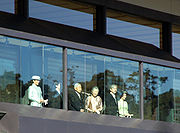
The Emperor's Birthday
Encyclopedia

Holiday
A Holiday is a day designated as having special significance for which individuals, a government, or a religious group have deemed that observance is warranted. It is generally an official or unofficial observance of religious, national, or cultural significance, often accompanied by celebrations...
in the Japanese calendar
Japanese calendar
On January 1, 1873, Japan adopted the Gregorian calendar. Before 1873, the Chinese style lunisolar calendar had been in use since 7th century. Japanese eras are still in use.-System:...
. It is currently celebrated on 23 December. The date is determined by the present Emperor
Emperor of Japan
The Emperor of Japan is, according to the 1947 Constitution of Japan, "the symbol of the state and of the unity of the people." He is a ceremonial figurehead under a form of constitutional monarchy and is head of the Japanese Imperial Family with functions as head of state. He is also the highest...
's birthdate. Emperor Akihito was born on this date in 1933.
During the reign of Hirohito
Hirohito
, posthumously in Japan officially called Emperor Shōwa or , was the 124th Emperor of Japan according to the traditional order, reigning from December 25, 1926, until his death in 1989. Although better known outside of Japan by his personal name Hirohito, in Japan he is now referred to...
(Showa period
Showa period
The , or Shōwa era, is the period of Japanese history corresponding to the reign of the Shōwa Emperor, Hirohito, from December 25, 1926 through January 7, 1989.The Shōwa period was longer than the reign of any previous Japanese emperor...
, 1926–1989), the Emperor's birthday was observed on 29 April. That date remained a public holiday, posthumously renamed Greenery Day
Greenery Day
is a Japanese holiday. Between 1989 and 2006 it was celebrated on April 29. In 2007 Greenery Day was moved to May 4.The present observation of Greenery Day as a national holiday in Japan stems from the celebration of the Emperor Shōwa's birthday on April 29 every year during the Shōwa era...
in 1989 and Showa Day
Showa Day
is a Japanese annual holiday held on April 29. It honors the birthday of the Shōwa Emperor , the reigning Emperor from 1926 to 1989. The purpose of the holiday is to encourage public reflection on the turbulent 63 years of Hirohito's reign.-History:...
in 2007.
Prior to World War II
World War II
World War II, or the Second World War , was a global conflict lasting from 1939 to 1945, involving most of the world's nations—including all of the great powers—eventually forming two opposing military alliances: the Allies and the Axis...
, it was called , or Emperor's Birthday, but after the war the new government renamed it Tennō tanjōbi, less formal language with the same meaning, in 1948, when it was established as a holiday by law. Under the law, the Diet of Japan
Diet of Japan
The is Japan's bicameral legislature. It is composed of a lower house, called the House of Representatives, and an upper house, called the House of Councillors. Both houses of the Diet are directly elected under a parallel voting system. In addition to passing laws, the Diet is formally...
must convene and change the holiday date before the reigning emperor's birthday becomes a public holiday. Thus, there exists a small chance that the former emperor's birthday may come before the change can be made.
On 23 December, a public ceremony takes place at the Imperial Palace
Kokyo
is the main residence of the Emperor of Japan. It is a large park-like area located in the Chiyoda area of Tokyo close to Tokyo Station and contains several buildings including the main palace , the emperor left Kyoto Imperial Palace for Tokyo...
which, usually off limits to the public, opens its gates. The Emperor, accompanied by Empress Michiko
Empress Michiko of Japan
Empress Michiko of Japan is the wife and consort of Emperor Akihito, the current monarch of Japan. She was the first commoner to marry into the Japanese Imperial Family. As crown princess and later as empress consort, she has become the most visible and widely-travelled imperial consort in...
and several other members of the Imperial family, appears on a palace balcony to acknowledge the birthday congratulations of crowds of festive well-wishers waving tiny Japanese flags. Only on this occasion and on 2 January may the general public enter the inner grounds of the Imperial Palace.
When the Emperor ceases his greeting (however brief), the crowd starts waving the flags again and the Imperial Family wave back.

